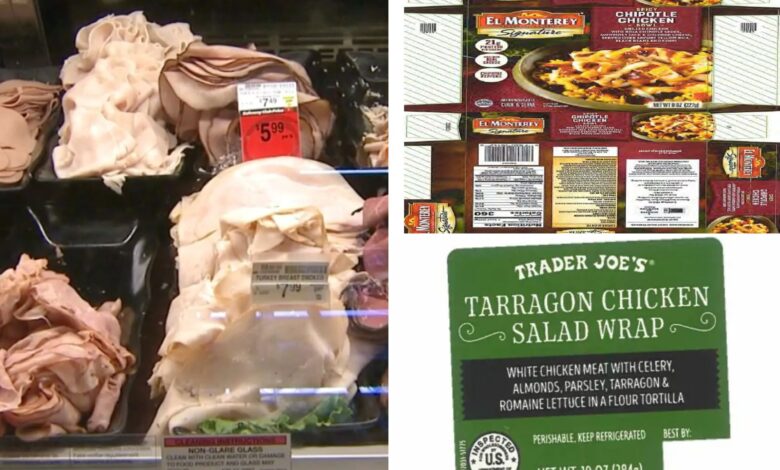Recall of 10M pounds of meat includes frozen dinners, salads sold to Trader Joe’s, Kroger, Amazon Fresh

Nearly 10 million pounds of beef and chicken that has been recalled over possible listeria contamination can be found in frozen dinners and fresh salads from Trader Joe’s, Jenny Craig, Amazon Fresh and big grocery chains including Kroger, according to US regulators.
An updated list released Friday by the US Department of Agriculture includes popular meals like the Dole Classic Cobb salad, Trader Joe’s Lemon Chicken & Arugula salad and Tarragon Chicken Salad Wrap. Also on the list are the Amazon Fresh Fiesta and Caesar salads and Jenny Craig’s Classic Chicken Carbonara.
Listeria can survive in frozen foods, according to food safety experts.
The 203-page list is the most comprehensive to date by the US Department of Agriculture. In addition to the branding and packaging, the list indicates which supermarkets sold the potentially tainted chicken and beef.
The agency’s first list on Oct. 9 created confusion as it provided only product codes and abbreviations that were difficult if not impossible for shoppers to understand.
“We are updating all the products with labels as soon as we get the information,” a USDA spokesperson told The Post.
Last week, the federal agency said Durant, Okla.-based BrucePac recalled 10 million pounds of its ready to eat meat that it sells to grocery stores, restaurants and institutions after the agency discovered the presence of listeria in some of its poultry products.
“This recall is concerning due to its sheer scale – nearly 10 million pounds of ready-to-eat chicken distributed through popular brands like Trader Joe’s, Amazon Fresh, Kroger, and Dole,” Patrick Quade, chief executive of iwaspoisoned.com, which tracks food-borne illnesses.
“With such broad distribution, and the inclusion of frozen items and fresh meals, there is an elevated risk that contaminated products could still be in consumers’ refrigerators and freezers, increasing the potential for future illness reports,” Quade added.
So far there have been no reported illnesses by consumers, according to the USDA, which has been on the hot seat since the Boar’s Head listeria recall in July involving more than 7 million pounds of cold cuts that has resulted in 10 deaths and dozens of hospitalizations.
The agency has come under fire because the Boar’s Head processing plant in Jarratt, Va. where the tainted meat was produced, had a history of numerous inspection violations that the agency was aware of.
Now the USDA is conducting an investigation that could result in criminal charges against the century-old, family-owned business based in Sarasota, Fla.
In the case of BrucePac, the USDA said it discovered the issue after conducting routine testing of poultry products. The testing came back positive for Listeria monocytogenes, a species of bacteria that causes infection and could lead to death in severe cases.
The Food Safety and Inspection Service – a branch of the USDA that overseas meat facilities – said in a statement that it is “concerned that some products may be available for use in restaurants, institutions and other establishments. These other establishments may have used affected meat and poultry in [ready to eat] products that may be on store shelves or in consumers’ refrigerators or freezers.”
BrucePac is responsible for notifying retailers about the recall and the stores are responsible for removing the potentially tainted products from their shelves. But other than media reports about the recalls, outreach to consumers is limited.
“The clustering of two large listeria-related recalls raises concerns about possible vulnerabilities in parts of the ready-to-eat food supply chain,” added Quade.




